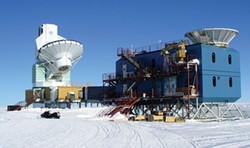[
{
"name": "Top Stories Video Pair",
"insertPoint": "7",
"component": "17087298",
"parentWrapperClass": "fdn-ads-inline-content-block",
"requiredCountToDisplay": "1"
}
]
Last spring, researchers observing from the South Pole BICEP2 telescope claimed to have found virtually indisputable proof that the universe began in a spurt of insanely rapid inflation nearly 14 billion years ago. (Think of a car's air bag deploying in a fraction of a second, then multiply the expansion and shorten the time by a few quadrillion, and you're on the right track.) This was Big News to cosmologists and physicists, who would love to understand how the conditions we now observe came about.
The quest to match cosmological observations to theory comes with a huge problem: Of all possible universes, ours is strikingly simple — too simple to have just happened by chance. Given the myriad possibilities of starting conditions, the "shape" — in a gravitational sense — of our cosmos is weirdly flat and smooth. For it to have turned out the way it did, the universe must have started out unbelievably fine-tuned. But why? Thirty-some years ago, Alan Guth, then a young post-doc at Caltech, proposed a way out: inflation. Inflation theory posits that, a split-second after time-zero, the universe expanded exponentially, flattening out any irregularities in the process (imagine stretching a sheet of rubber to smooth out any wrinkles). Inflation makes the initial conditions (the wrinkles) irrelevant, thus eliminating the need for fine-tuning.
Surprisingly, the theory is testable. If true, we should still be able to detect a swirly pattern of primordial gravity waves that emanated during the inflationary phase. It's that pattern, the "B-mode polarization of the cosmic microwave background radiation," that the BICEP2 consortium claimed to have seen last year. Except they didn't. In a year-long series of egg-on-our-faces statements, the researchers reversed themselves and now acknowledge that galactic dust was responsible for most, if not all, of their observations.
Many scientists — including Princeton University's Einstein Professor in Science Paul Steinhardt, ironically one of the originators of inflation theory — were anything but surprised by the setback. Steinhardt and others have long been criticizing the theory as a non-falsifiable "theory of anything." The whole point of inflation was to eliminate the fine-tuning requirement of the early universe, but it turns out that for inflation to stop, you need a different set of fine-tuned constants to govern it. Replacing one type of fine-tuning with another is hardly progress.
A fine-tuned universe without apparent cause is an accidental universe: "We're here because we're here because we're here," as the song goes. Or maybe our universe is just one of many — an infinite number, in most "multiverse" theories — in which the conditions here (but not elsewhere) are just right for galaxies and stars to form, life to start and at least one sentient species to start asking questions about how it all began. If it were otherwise, we wouldn't be here arguing about it; it's dubbed the "anthropic principle."
Which is not science. It's defeatism. It explains nothing. We can do better. Which might be the motto of the BICEP folks, as they prepare to install their new and improved BICEP3 gravity wave detection array at the South Pole. This time around, they may be a bit more cautious before announcing any universe-shaking results.
Barry Evans ([email protected]) thinks the universe is weirder than we can imagine, while taking heart that his Field Notes anthologies are for sale at local bookstores.
Comments (5)
Showing 1-5 of 5
more from the author
-
A Brief History of Dildos
- Apr 11, 2024
-
Eclipse!
- Mar 28, 2024
-
The Little Drone that Could
- Mar 14, 2024
- More »
Latest in Field Notes
Readers also liked…
-
Trouble on the Line: The Reality Part 2
- Nov 3, 2022


































